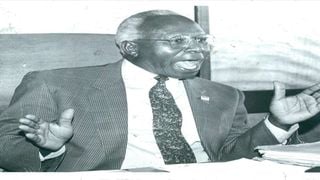
Former Cabinet Minister Simeon Nyachae who died on February 01, 2021 at the age of 88.
| File | Nation Media GroupNews
Premium
The life and times of political heavyweight Simeon Nyachae
What you need to know:
- For many years, Nyachae was regarded as the indisputable spokesman for the Gusii community’s political and governance affairs.
- Nyachae was one of the most powerful figures during the administration of Presidents Jomo Kenyatta and Daniel arap Moi.
Former powerful Cabinet Minister Simeon Nyachae, an untiring go-getter who served in the Kenyatta, Moi and Kibaki governments, died yesterday after battling illness for years.
He was aged 89.
The son of colonial chief Musa Nyandusi died at The Nairobi Hospital, where he had been admitted for the last one month, doctors said.
“We are deeply saddened by his death,” his eldest son Charles said at the Lee Funeral Home where his body is being kept.
Nyachae, who was born on February 6, 1932, in Nyosia village, Nyaribari, Kisii County, was among well-known civil servants, politicians and businessmen in the country.
He served in almost all senior positions in government, except presidency, in a long career spanning close to four decades in which he straddled Kisii politics like a colossus.
He was regarded as the indisputable spokesman for the Gusii community’s political and governance affairs since the 1970s up to 2007, when his political career was abruptly cut shot by a political rookie, Dr Robert Monda, who trounced him as the Nyaribari Chache MP at the latter’s political debut.
Nyachae was one of the most powerful figures during the administration of Presidents Jomo Kenyatta and Daniel arap Moi, and he came in handy in 2004 to save the presidency of Mwai Kibaki.
Having served as Provincial Commissioner (PC) in Central Kenya and Rift Valley, where he established himself as a no-nonsense power hawk, he was tapped into the high echelons of the Kenya African National Union (Kanu) government’s public service.
During his days as a provincial administrator, Nyachae distinguished himself as a principled and courageous man who perhaps handled one of the most difficult jobs in Mzee Kenyatta’s government.
Kenyatta’s speech
He was tasked with reading founding President Jomo Kenyatta’s speech during the burial of firebrand Nyandarua politician J.M. Kariuki, whose controversial murder was blamed on the Kenyatta regime.
Following J.M. Kariuki’s death, Nyandarua residents composed a song dubbed Maai ni Maruru (the waters are bitter) to express their anger. Nyachae, who was the Rift Valley PC, swiftly banned the dirge because of its underlying political overtones.
No Cabinet ministers, even those who would have ordinarily represented the President, were willing to read the President’s speech at the MP’s funeral.
Notably, Kibaki was the only Parliamentarian who attended the funeral ‘as a friend’ during which he condemned the assassination.
Amidst the tension, Nyachae not only read Mzee’s speech but also condemned the killing.
Some of his statements displeased members of the Kenyatta administration, who murmured that the PC had crossed the line. Nevertheless, the act thrust him further into the public limelight.
When Kenyatta died in 1978, Moi retained Nyachae and appointed him to senior positions in the public service.
He rose through the ranks to become the Permanent Secretary in charge of National Development Coordination and eventually Chief Secretary, making him one of the most influential individuals in that position since independence.
During that time, the position was a potent mix between politics and bureaucracy, with the line in between blurred.
Too powerful
There was a feeling by Moi and members of his inner circle that Nyachae was becoming too powerful and that his powers had to be tamed. Never before had a public servant become so larger than life, frequently exploiting State bureaucracy to reprimand even Cabinet ministers. So influential was Nyachae that he was christened the ‘prime minister’.
Moi diluted the position to Head of Civil Service and Secretary to the Cabinet by the time Nyachae was retiring in 1987 after attaining the age of 55 years.
After he retired, Nyachae concentrated on his businesses. He has vast interests in horticulture, banking, real estate, insurance, milling and confectionary.
Nyachae’s relationship with Moi, however, deteriorated during his retirement. This was largely due to his strong personality and a narrative by individuals around Moi that he (Nyachae) was working with forces keen to remove his former boss from power.
His businesses were sabotaged and his attempts to vie in the 1988 mlolongo elections were thwarted when his name was ‘found missing’ from the Kanu party list.
In his book, Walking in the Corridors of Service, Nyachae revealed that his major reason for joining politics was to protect his business interests.
He singles out a case in which the Kanu regime accused him of intending to use his wealth to destabilise the Moi government.
Fallout with Moi
There was a feeling within the Kanu power circle that he was an arrogant enemy whose unbridled ambitions had to be nipped in the bud. But threatened with what appeared to be a formidable opposition, Moi persuaded him to run for the Nyaribari Chache MP seat, which he won decisively during the 1992 polls. Moi then appointed him to the Agriculture docket and later to Finance.
But in 1998, Nyachae landed in trouble after he stated publicly that the government was bankrupt. Subsequently, Moi transferred him to the Industrialisation ministry, which he considered a demotion. He resigned in a huff.
For some time, donors had put pressure on Moi to open the country’s democratic space by withdrawing funds. The economy was in tatters even as Moi continued to put on a brave face.
Then Nyachae did the unthinkable.
He convened a conference of public officials in Mombasa during which he revealed one of the biggest secrets of the Moi administration: he made the infamous declaration that the country’s economy was “in the intensive care unit due to corruption”.
The effect of the declaration was palpable anger from Moi. Nyachae’s statement had not only buttressed the Opposition argument that Moi had run down the economy, but emboldened donors against the President.
There was a persuasion in the Moi power circle that Nyachae was keen to embarrass the President. He was an ‘enemy within’.
Quit Kanu
Nyachae was a man keen to use his privileged background, solid connections in the provincial administration and wealth to assert himself.
Moi took Nyachae’s declaration in Mombasa on corruption in the Kanu government as a personal affront to his authority.
After falling out with Moi, Nyachae quit Kanu to join FORD-People, which he used as a platform to test his political stamina and advance his ambitions.
This would put him in direct confrontation with Moi, and accidentally, Kibaki.
There has been this argument that had it not been the controversy under which Kibaki was declared the joint parties’ Presidential candidate for the 2002 elections, effectively diminishing Nyachae’s State House ambitions, there were never fundamental political and ideological differences between the two political heavyweights.
That is why their story remains that of comrades put asunder and brought together by a common dominator — the political ambitions of ODM leader Raila Odinga.
At the same time, as Nyachae quit Kanu, Odinga had led a massive walkout of influential stalwarts from Kanu following a disagreement with Moi occasioned by the choice of Uhuru Kenyatta, then a political greenhorn, as his preferred successor.
Odinga and his group, which comprised former Vice President George Saitoti and Cabinet ministers Kalonzo Musyoka, William ole Ntimama, Deputy Speaker Joab Omino, Moody Awori, David Musila among others, founded the Liberal Democratic Movement (LDP) with which they waged war against Moi.
Political fortunes
Nyachae had signed a political agreement with the LDP and a rally had been planned at Uhuru Park to make the announcement.
Then Odinga made a declaration that would radically change Nyachae’s political fortunes and create animosity between the two politicians, which they have never been able to reconcile.
Many Kenyans would remember the sea of humanity at the Uhuru Park on that day.
The crowd had made it a clear that it wanted a single presidential candidate. When Odinga spoke, he said “Kibaki tosha (Kibaki suffices)”, recalled David Musila in his memoir, Seasons of Hope.
The crowd approved and Kibaki became the opposition presidential candidate.
Nyachae was angry. He felt betrayed by Odinga. Nyachae had proposed that the Opposition candidate be chosen through secret ballot by delegates.
And, as Nyachae would himself reveal, the Odinga declaration caught him by surprise.
Although a group of leaders had come up with a structure of government in which they assigned the position of deputy prime minister to Nyachae, he rejected the offer and mounted a lone State House bid on a FORD-People ticket.
His party came out with 14 MPs in a poll which Kibaki won by landslide, ending 24 years of Kanu rule. Nyachae emerged third with 700,000 votes and 14 MPs, mainly from his home area.
In his memoirs, Nyachae revealed that he resolved to run fully aware that FORD-People stood no chance of winning the Presidency.
“We felt strongly that we had to go ahead as a matter of principle despite the signs that we were unlikely to win,” he wrote.
Rescued Kibaki
But, threatened with exit from power by a group of politicians led by Odinga who had threatened to move a motion of no confidence against him over differences arising from the 2002 pre-election power pact with LDP, Kibaki reached out to Nyachae to come to his rescue.
The presence of Nyachae, the Forum for the Restoration of Democracy-People (FORD-People) leader and supremo of Gusii politics in the Kibaki Cabinet, was a very unlikely political development.
But as he later revealed, it was an act of grace that not only saved Kibaki’s government from collapse but also his Presidency.
That would be odd for a politician who had protested Kibaki’s choice as the Opposition Presidential candidate and even left the Rainbow Alliance in a huff to contest against him in a campaign in which he spewed choice epithets against Kibaki.
It should be emphasised that Nyachae found his way into the Kibaki government as a member of the Government of National Unity in 2004 to reinforce a vulnerable Presidency. Kibaki had been informed that even his Cabinet ministers were keen to vote against him.
“If the vote carried the day, it would mean the President either resigns or dissolves Parliament, a move that was likely to plunge the country into chaos,” he recalled in his autobiography.
“So the president suggested a government of a national unity involving opposition politicians to avoid an impending catastrophe,” said the former minister.
The other who came alongside him were Opposition MPs Njenga Karume and Kipkalya Kones, then a FORD-People nominated MP. Nyachae was appointed as the Energy Minister before being moved to Roads and Public works in 2006.
He remained a major cog in the Kibaki administration in the face of formidable opposition by members of ODM leaders who were waging war against the government after they we sacked from government after the defeat of the Wako Draft in the 2005 referendum.






